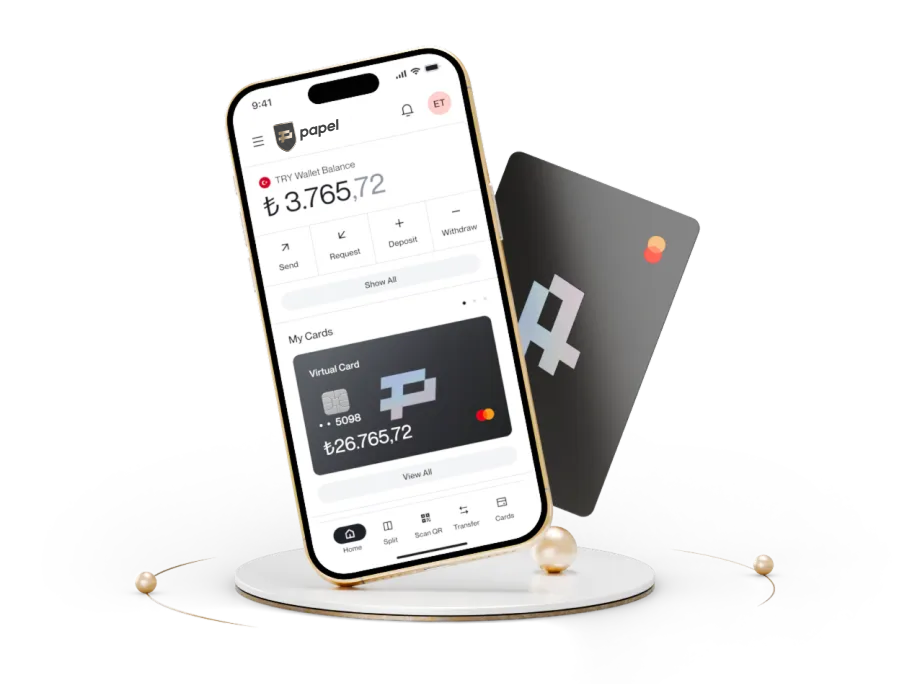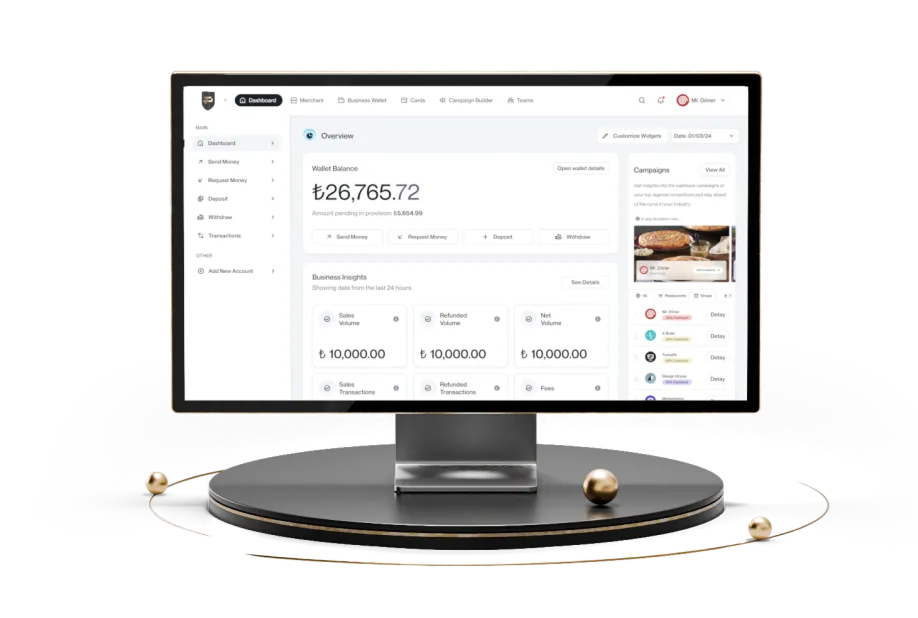İşletmeler İçin Gider Gösterilebilecek Harcama Türleri ve Kullanım Şartları Nelerdir?
Şirketler için kritik önemi olan konulardan biri de gider gösterme. Peki, gider göstermek için koşullar nelerdir? Neleri gider gösterebiliriz? Neler gider olarak gösterilmez? Papel Blog’un bu yazısında işletme gideri nedir, hangi harcamalar gider olarak gösterilebilir, gider gösterme sürecinde dikkat edilmesi gereken noktalar nelerdir gibi daha birçok soruyu senin için cevaplıyoruz.
İşletme gideri nedir?
Bir işletmenin faaliyetlerini sürdürebilmesi için gerekli olan belirli ürün ve hizmetler vardır. Bu ürün ve hizmetlerin maliyetlerine işletme giderleri denir. Bu giderler, işletmenin günlük faaliyetlerini destekleyen harcamaları kapsar. İşletme giderlerinin doğru gösterilmesi önemlidir. Çünkü yanlış veya usulsüz gösterilen giderler yasaya aykırı olduğundan işletme, ceza ile karşılaşabilir. Bu sebeple sürdürülebilirlik ve güvenilir bir imaj yaratmak adına işletmeler harcamalarını doğru bir şekilde göstermelidir. İşletme giderlerinin işletme gelirinden düşülerek vergi matrahı azaltılabilmesi için yürürlükteki vergi yasalarına göre yapılan harcamanın ilgili işletmenin kârı ya da faaliyetleri ile ilişkisi olması gerekir. Ancak bu koşulu yerine getiren harcamalar şirket gideri olarak kabul edilebilir. İşletme giderlerinin doğru bir şekilde tanımlanması ve raporlanması hem yasal yükümlülüklerin yerine getirilmesi hem de finansal sağlığı açısından çok önemlidir.
Şirkete gider göstermek ne işe yarar?
Şirketlerin gider göstermesinin, finansal ve operasyonel açıdan çeşitli avantajları vardır. Öncelikle, işletme faaliyetleriyle ilgili yapılan harcamaların gider olarak kaydedilmesi, vergi matrahını düşürerek ödenecek vergi miktarını azaltır. Mesela yemek, ulaşım, ofis ve personel giderleri gibi kalemler, doğru belgelerle desteklenirse vergiden düşülebilir. Ayrıca, şirket masraflarının gider olarak gösterilmesi, işletme sahiplerini her üründe geçerli olan Katma Değer Vergisi (KDV) tutarlarını ödemekten de kurtarır. Bunun yanı sıra, giderlerin düzenli ve doğru bir şekilde kaydedilmesi, işletmenin mali durumunu net bir şekilde görebilmesini sağlar. Bu sayede bütçe planlaması, mali analizler ve stratejik kararlar daha sağlıklı yapılabilir. Son olarak, işletme giderlerinin doğru ve eksiksiz bir şekilde belgelenmesi, yasal mevzuata uyum açısından kritiktir. Yanlış veya usulsüz gösterilen giderler yasaya aykırıdır ve ceza ile karşılaşılması mümkündür. Yani şirketlerin giderlerini doğru ve eksiksiz bir şekilde belgelemeleri hem vergi avantajlarından faydalanmalarını hem de finansal yönetimlerini sağlıklı bir şekilde sürdürebilmelerini sağlar. Vergi Usul Kanunu (VUK)’un belirlemiş olduğu yasal çerçeveye göre hareket etmek şirketlerin sorunlarla karşılaşmaması için önemlidir. VUK ile ilgili daha çok bilgi almak istiyorsan doğru yerdesin. VUK (Vergi Usul Kanunu) Nedir? VUK Tebliğ 507 ve 509 Hakkında Bilmen Gerekenler yazımızda Vergi Usul Kanunu ile ilgili bilgileri senin için derledik.
Gider göstermenin şartları nelerdir?
İşletmeler giderlerini yasal olarak kabul ettirebilmek için belirli şartları karşılamalıdır. Bu şartları şu şekilde sıralayabiliriz:
Faturaların ve Belgelerin Yasal Olarak Düzenlenmesi
Şirket giderlerinin geçerli sayılabilmesi için ilgili harcamaların usule uygun olarak düzenlenmiş belgelerle desteklenmesi gerekir. Bu belgeler arasında fatura, serbest meslek makbuzları, gider pusulaları ve ücret bordroları gibi belgeler vardır. Yasal mevzuata uyabilmesi için belgelerin eksiksiz ve doğru bilgilerle doldurulması gerekir.
Harcamanın İşletme Faaliyeti ile Doğrudan İlgili Olması
Bir harcamanın gider olarak kabul edilebilmesi için işletmenin faaliyetleriyle doğrudan bağlantılı olması gerekir. Yürürlükteki vergi yasalarına göre, bir harcamanın şirket gideri olarak gösterilebilmesi için ilgili işletmenin kârı ya da faaliyetleri ile ilişkisi olması şarttır. Mesela, ofisten yürütülen bir işin varsa kırtasiye harcamalarını gider olarak gösterebilirsin.
Vergi Kanunlarına Uygunluk
Giderlerin vergi mevzuatına uygun olması esastır. Örneğin, bazı harcamalar kanunen kabul edilmeyen giderler (KKEG) kapsamında değerlendirilebilir ve bu tür harcamaların vergiden düşülmesi mümkün değildir. Bu nedenle, giderlerin yasal düzenlemelere uygunluğu kritiktir.
Giderlerin Belgelenmesi İçin Gerekli Evraklar Nelerdir?
Giderlerin belgelenmesi için aşağıdaki evraklar düzenlenmelidir. Bu evrakların eksiksiz ve doğru bilgilerle düzenlenmesi, giderlerin yasal olarak kabul edilmesi ve işletmenin mali kayıtlarının doğruluğu için çok önemlidir.
Fatura
Mal veya hizmet alımlarında satıcı tarafından düzenlenen ve alımın detaylarını gösteren belgedir.
Gider Pusulası
Vergi mükellefi olmayan kişilerden alınan mal veya hizmetler için işletme tarafından iki nüsha olarak düzenlenen belgedir. Gider pusulasında malın cinsi, adedi, malı satan veya satın alan kişinin adı, malın fiyatı ve düzenlenme tarihi gibi bilgiler olmalıdır.
Serbest Meslek Makbuzu
Serbest meslek sahiplerinin sundukları hizmetler karşılığında düzenledikleri belgedir.
Ücret Bordrosu
Çalışanlara ödenen ücretlerin detaylarını gösteren belgedir.

Gider gösterilebilecek harcama türleri nelerdir?
İşletmeler, faaliyetlerini sürdürürken çeşitli harcamalar yaparlar ve bu harcamaların bir kısmını vergi matrahından düşerek gider olarak gösterebilirler. Her şirketin faaliyet alanına göre geçerli olarak kabul edilebilecek giderlerinin değişkenlik gösterdiğini unutmamak gerekir. Gider olarak kabul edilebilecek başlıca harcama türleri şu şekildedir:
Yemek Giderleri
İşletme sahipleri ve çalışanların iş saatleri içinde yaptıkları yemek harcamaları gider olarak gösterilebilir. Bu harcamalar fatura veya fiş ile belgelenmeli ve işletme faaliyetleriyle ilgili olmalıdır.
Çalışan Ödemeleri
Personellere ödenen maaşlar, primler ve sosyal güvenlik primleri gibi ödemeler işletme gideri olarak kabul edilir. Bu ödemelerin bordrolarla ve banka dekontlarıyla belgelenmesi gerekir.
Ulaşım ve Taşıma Giderleri
İşletme faaliyetleri kapsamında yapılan ulaşım ve seyahat harcamaları, örneğin toplu taşıma, taksi ücretleri ve iş amaçlı araç kullanımıyla ilgili masraflar gider olarak gösterilebilir. Bu harcamalar bilet, fatura ve fiş gibi belgelerle desteklenmelidir.
Giyim Harcamaları
İşletme faaliyetleri için gerekli olan ve işin niteliğine uygun özel kıyafetler veya üniformalar için yapılan harcamalar gider olarak kabul edilir. Ancak, kişisel kullanım amaçlı giyim harcamaları gider olarak gösterilemez.
Enerji ve İletişim Fatura Giderleri
İşletmeye ait elektrik, su, doğalgaz, telefon ve internet gibi hizmetlerin faturalar işletme adına düzenlenmiş olması ve ödemelerin belgelenmesi şartıyla gider olarak gösterilebilir.
Kira ve Aidat Giderleri
Ofis, dükkân veya diğer çalışma alanları için ödenen kira bedelleri ve buna bağlı aidatlar gider olarak kabul edilir. Bu harcamaların kira sözleşmesi ve ödeme dekontlarıyla desteklenmesi gerekir.
Yazılım, SaaS ve Reklam Harcamaları
İşletmenin faaliyetlerini sürdürmek için kullandığı yazılımlar, abonelik tabanlı hizmetler (SaaS) ve ürün veya hizmetlerin tanıtımı için yapılan reklam harcamaları gider olarak gösterilebilir. Bu harcamaların faturalarının saklanması önemlidir.
Ofis Giderleri
İşletmenin günlük faaliyetleri için gerekli olan ofis malzemeleri, kırtasiye ürünleri ve temizlik malzemeleri için yapılan harcamalar gider olarak kabul edilir. Bu tür harcamaların faturaları saklanmalıdır.
Danışmanlık Giderleri
İşletmenin ihtiyaç duyduğu hukuki, mali veya teknik konularda aldığı danışmanlık hizmetleri için yapılan ödemeler gider olarak gösterilebilir. Bu tür harcamalar da fatura ve sözleşmelerle belgelenmelidir.
Araç Giderleri
İşletme faaliyetlerinde kullanılan araçların akaryakıt, bakım, sigorta ve benzeri masrafları gider olarak kabul edilir. Bu harcamaların faturaları ve ödeme belgeleri saklanmalıdır.
Hediye Kartı
Müşteri veya çalışanlara verilen hediye kartları için yapılan harcamalar, belirli sınırlar dâhilinde ve belgelendirilmiş olması şartıyla gider olarak gösterilebilir. Bu harcamalar fatura ve teslim belgeleriyle desteklenmelidir.
Şirket Aracı
İşletme adına kayıtlı araçların satın alma, kiralama, bakım ve diğer masrafları gider olarak kabul edilir. Bu harcamaların da ilgili belgelerle desteklenmesi önemlidir.

İşletme gideri gösterirken nelere dikkat edilmeli?
İşletme giderlerini doğru bir şekilde göstermek hem yasal uyumluluk hem de finansal sağlığın korunması açısından kritik öneme sahiptir. Bu süreçte dikkat edilmesi gereken temel konular şunlardır:
Harcamaların İşletme Faaliyetiyle İlgili Olması
Yapılan harcamalar doğrudan işletmenin faaliyetleriyle bağlantılı olmalıdır. Mesela, işle ilgili olmayan aile veya arkadaşlarla yapılan yemek harcamaları, kişisel tatil masrafları gibi giderler işletme gideri olarak kabul edilmez.
Belgelerin Usulüne Uygun Düzenlenmesi
Giderlerin yasal olarak kabul edilebilmesi için fatura, fiş, makbuz gibi belgelerin eksiksiz ve doğru bilgilerle düzenlenmiş olması şarttır. Özellikle harcamanın türü, tutarı, tarihi ve tarafların bilgileri açıkça belirtilmelidir.
Kanunen Kabul Edilmeyen Giderlerden Kaçınma
Vergi mevzuatına göre bazı harcamalar gider olarak kabul edilmez. Mesela, işle ilgisi olmayan kişisel harcamalar, çalışana ait özel hatların iletişim giderleri gibi masraflar şirket gideri değildir ve o şekilde kaydedilmemelidir.
Giderlerin Belgelendirilmesi
Tüm giderler uygun belgelerle desteklenmelidir. Mesela, yemek giderleri için restoran faturaları, seyahat giderleri için biletler ve konaklama faturaları gibi belgeler saklanmalıdır. Bu belgeler, denetim olması durumunda yasal dayanak oluşturur.
Giderlerin Muhasebe Kayıtlarına Doğru İşlenmesi
Belgelenen tüm harcamaların, muhasebe kayıtlarına doğru ve eksiksiz bir şekilde işlenmesi gerekir. Bu, işletmenin finansal durumunun gerçekçi bir şekilde yansıtılmasını sağlar ve yasal yükümlülüklerin yerine getirilmesine yardımcı olur.
Gider gösterirken sık yapılan hatalar nelerdir?
İşletme giderlerini beyan ederken sıkça karşılaşılan hatalar hem yasal uyumsuzluklara hem de finansal sorunlara neden olabilir. Bu hataların başında kişisel harcamaların gider olarak gösterilmesi yer alır. Aile ya da arkadaşlarla yapılan yemekler gibi harcamalar işletmenin faaliyetlerinden bağımsız olduğu için gider olarak kabul edilmez. Ayrıca, çalışanlara ait özel araçlarının yakıtı ya da kişisel telefon hatlarının faturaları gibi kişisel giderlerin de işletme gideri olarak gösterilmesi yanlıştır. Bu tür harcamalar, işletme faaliyetleriyle doğrudan ilişkili olmadığı için şirket gideri olarak kabul edilemez. Bununla beraber şirket aktifinde olmayan varlıkların giderlerinin de kaydedilmesi gibi hatalar sık olarak karşılaşılan hatalardandır. Şirketin aktifinde kayıtlı olmayan veya kiralama sözleşmesi bulunmayan araçların yakıt, tamir gibi masraflarının gider olarak gösterilmesi doğru değildir. Bu tür durumlarda, ilgili sözleşmelerin ve belgelerin düzenlenmesi gerekir. Yanlış gider göstermenin yanı sıra belgelerle ilgili yapılan hatalarla da karşılaşılabilir. Giderlerin yasal olarak kabul edilebilmesi için usulüne uygun düzenlenmiş fatura, fiş veya makbuzlarla belgelenmesi gerekir. Belge eksikliği veya hatalı belgeler gibi durumlarda giderlerin reddedilebilir. Her şey tamamen uygun dahi olsa vergi mevzuatına göre bazı harcamalar gider olarak kabul edilmez. Mesela, işle ilgisi olmayan giyim harcamaları veya işletmenin gelirini artırıcı fonksiyonu olmayan diğer giderler bu harcamalardandır.
Sık Sorulan Sorular
Vergi iadesi nedir?
Türkiye’de kişilerin ve işletmelerin vergilendirilme çeşit ve yöntemleri yasalarla belirlenmiştir. İşletmeler bu yasalarda belirlenen bazı koşulları sağlarsa ödedikleri vergi miktarının bir kısmını geri alabilir. İşletmelere sağlanan bu kolaylığa “vergi iadesi” denir. Vergi iadesiyle ilgili merak ettiğin soruları Papel Blog’un Vergi İadesi: Nasıl Başvurulur ve Süreç Nasıl İşler? Yazısında senin için cevaplıyoruz.
Kanunen kabul edilmeyen giderler (KKEG) nelerdir?
Kanunen kabul edilmeyen giderler (KKEG), vergi yasalarına göre şirketlerin vergi matrahını düşürmek için gider olarak gösteremeyeceği harcamalardır; bunlar genellikle kişisel harcamalar veya vergiye tabi olmayan giderlerdir.
Abonelik tabanlı hizmetler (SaaS) nelerdir?
Abonelik tabanlı hizmetler (SaaS), kullanıcıların belirli bir süre için hizmeti kullanma hakkı elde ettikleri ve genellikle aylık veya yıllık ödeme yapılan yazılım hizmetleridir; bulut tabanlı yazılım uygulamalarını buna örnek olarak verebiliriz.
Kaynaklar: 1.

